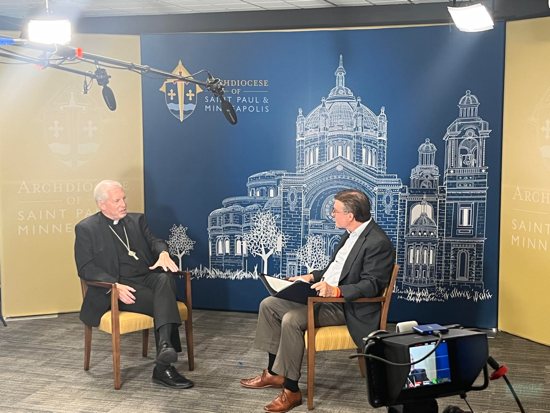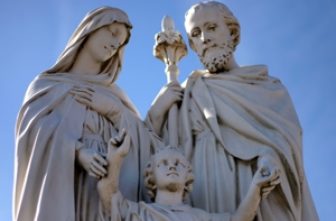
As Bishop-elect Kevin Kenney prepared for his Oct. 28 ordination and installation as an auxiliary bishop of the Archdiocese of St. Paul and Minneapolis, he took time Oct. 3 to talk with The Catholic Spirit about his family, ministries, prayers and his love of dancing. The conversation is edited for length and clarity.
Q) Bishop-elect Kenney, thank you for joining us. As you prepare for your ordination, what would you like the faithful of the Archdiocese of St. Paul and Minneapolis to know about you?
A) Where do you begin? Just that I’m a native son of Minneapolis. I’ve been a priest for 30 years. I have worked in a variety of different ministries during those 30 years, even before I was a priest. I hope to bring that into my ministry as auxiliary bishop. I hope to continue simply to bring Jesus Christ to people and walk with them, and hopefully be a good listener to people along the way.
Q) You were vicar for Latino ministry in the archdiocese for eight years, 2010 to 2018. It included reopening an archdiocesan Office of Latino Ministry in 2013. What was the archdiocese seeing at that time that made it a critical part of what needed to be done?
A) Continued growth of Hispanic ministry in the archdiocese. The influence on the Church of immigrants and those who had been here for generations (needed to be recognized), and we needed to organize and know how the archdiocese could serve Latinos in a better way. Part of that was to gather representatives from parishes as well as the overall community to come in and share with us what their needs were and what needs they wanted the Church to be able to provide for; to listen to that and to see if as a Church we could meet those needs, and to celebrate and involve the Latino community more widely within the archdiocese.
Q) Now as you approach your episcopal ministry, what are among your goals?
A) (I aim) to support Archbishop (Bernard) Hebda in the work he is wonderfully doing, to be able to support him in that. I assume I’m going to become a director of Latino ministry again, or have that as part of my job, working with the Latino community, to continue to involve them in the archdiocese, and the awareness not only of the Latinos, but of the multicultural archdiocese that we have become.
Q) Any other particular duties you might anticipate?
A) Not that I know of yet, but I’m sure there will be.
Q) You shared a beautiful story at the news conference (July 25 announcement of his appointment as auxiliary bishop) about how you came to be called to the priesthood … You presented yourself to the Lord, stating, “OK God, I’ll do anything you want me to do” while making it clear you did not want to work 24 hours a day, seven days a week or be a priest. But something must have entered your mind about the priesthood prior to that. Is there a way you might describe how you feel you were called to priestly ministry?
A) Growing up, I mean, it was always in the back of my mind. Growing up in a very Catholic, religious family, having uncles who are priests, religious brothers, and aunts who are nuns. I mean, we were always surrounded by that. And being an altar boy growing up as well. We would play Mass at home … that was part of our generation. I don’t know if a new generation or younger generation still play Masses at home, but we always used to. I was always the priest, you know, at home when we played Mass. We’d find a dead bird in the yard, and we’d do a little funeral procession and bury the bird. I was always the presider then as well. So, it was always in the back of my mind. … But the whole sense of it was, “I want to do it, but I don’t fit into the image of what that is, and of being, you know, pious or holy or back-offish.” I always wanted to be with people, enjoying life and being who I was.
And so, that was one of the bargains I made with God at the time. “OK, I’ll be a priest, but allow me to be me and not to be changed.” And whether that was selfish or what, I think it’s been a great gift, and it’s allowed me to continue to live my priesthood in that way.
Q) You were on a week-long canonical retreat, just recently, starting Sept. 21. As you prepare for your episcopacy, what can you share with us about that experience?
A) I did a private retreat out in Park City, Utah. Some friends of mine have a house there and they invited me to use it. I spent five days up there, reflecting. I was given some reading materials from the archbishop, and I had some other materials that I wanted to read and reflect on. … It was powerful in the sense of being able to spend that time with the Lord in the mountains of Utah. I went for a wonderful walk every day in the hills. And that was beautiful, to see God in nature and the beauty of that. … It was somewhat disturbing as well; reality was kind of setting in. This is a whole new way of life, a whole new way of looking at things. It’s a little bit disturbing, in a good way.”
Q) What was it like growing up in Minneapolis with six siblings and your parents?
A) Well, we were very orderly, in a good way. Back then, the neighborhood had five other families with seven children and a couple with five children and a couple with three children. So you didn’t have to go far to find a ballgame … We all had our chores. We had to make our bed when we got up in the morning. We always had to eat as a family at dinner … And if you didn’t like anything, you went hungry in the evening. You had to eat what was put on the table.
From the day we walked, we always joked, we had to work. My dad had a real estate office. My job was to empty all the wastebaskets, to go in and clean the office. The others had different jobs as well. We were taught you had to work hard, stay busy and stay out of trouble.
Q) Any hobbies or interests for yourself or family members?
A) My dad bought a boat when we were in our early teens or pre-teens, so we’d go on a ski weekend. Crystal Lake, mainly. Our vacation every year was going to Big Island on Lake Minnetonka with a bunch of families, good friends of my parents when they grew up and their families. We all had individual cabins, but we’d eat a common meal.
My dad would flood the backyard skating rink in the wintertime. Skating was a big thing, playing hockey.
Q) What is on your heart as you prepare to be ordained? What most moves you?
A) What moves me most is the excitement of the people.
Part of my hesitancy –– discerning –– after getting the telephone call (from Cardinal Christophe Pierre, apostolic nuncio to the United States, telling Bishop-elect Kenney that Pope Francis had appointed him as auxiliary bishop) and then saying yes and waiting for it to be announced was “how are people going to react to this?” Because, you know, in the world today, people just are not happy with the world’s situation: politics, the Church, things that are happening. Part of my doubts were (about) people saying, you know, “Why would you want to be a part of the hierarchy of the Church?” … But then my own saying, “Yes, I feel called to this and it’s a blessing.” The reactions of people (actually) are like, “We’re very excited that they called you. You will be representing the Church; you’ll be working with the Church and a voice in the Church.”
So that’s what’s on my heart –– that people are excited. And that there’s excitement again for the Church. Just to awaken the possibilities that the Holy Spirit –– where we will be able to walk in a way that makes people feel valuable and respected and listened to.
I’m sure the Lord will open a few doors and continue to move me where I need to be. And that excites me in a whole new way. Because honestly, before all of this came about, and I was thinking of retirement, I kept thinking, did I do all that I was supposed to do in my 30 years as a priest? Did I spend too much time doing a lot of reading or, you know, watching TV? Is there something more I could have done that I didn’t? Well, I guess there is. And now it’s like, OK, Lord, now you want me to be busy.
Q) What can we do to support you as you look toward your ordination?
A) Archbishop Hebda was wonderful with his listening sessions and what he has done. How do we continue to listen to the people? What people can do is support us and support their Church and their parish communities. And pray for me, because I feel those prayers.
One of the things I hear a lot is being called to be a bishop is a lonely life, because people put you farther away from them. That is not what Pope Francis wants of the bishops or the people. Don’t be afraid to talk to me or ask how I’m doing or just treat me for who I am.
One of my hobbies that I love to do is dancing. Growing up, in the living room when my mom and dad weren’t home, we’d move the coffee table, put the radio on and dance around. It’s something I’ve always enjoyed doing, throughout high school. Going out to the ballrooms. In the (Twin) Cities they used to have ballroom dancing and just dancing-dancing. … A lot of the parishes I worked in, especially Our Lady of Guadalupe (in St. Paul) I’d always learn a new cultural dance every year and participate in the festivals with that. And wedding receptions and parties. I love to get up and dance, and my mother loved to dance as well. She and I, at different parish festivals, we danced, and everyone thought that was great.
So as a bishop, I hope I can dance.



